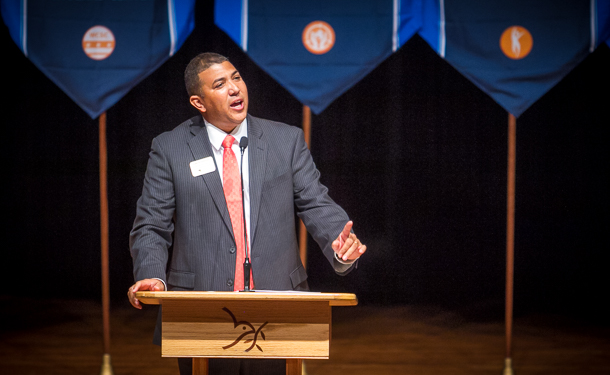When a person you know well makes a regrettable choice, how do you reconcile what you know about that person with his or her actions? And how do you share what you know about this person without seeming to excuse the action?
These questions immediately confronted Luke Hartman, vice president of enrollment at Eastern Mennonite University, when he saw on national news the footage of resource officer Ben Fields flipping over a black student’s desk and tossing her across the classroom in a South Carolina high school. [Fields was subsequently dimissed.]
In an essay published on the Sojourners website and co-written with Sheri Bailey, Hartman grapples with what he calls an “existential crisis,” caught between his knowledge of Fields as a person and his anger at yet another violent mistreatment of a black person. (Hartman is, he says, a “passionate advocate of the Black Lives Matter movement;” read more about his involvement on campus here.)
Hartman was once Ben Fields’ basketball coach at Hesston College in Kansas. Coach and athlete stayed in touch after Fields graduated, moved to South Carolina, and joined the law enforcement profession. On vacation, Hartman and his family stopped to visit him.
The footage of the incident immediately made Fields, in the judgement of the nation, Hartman writes, “a bigoted, violent, white police officer, his name added to the long and growing list of racist public servants.”
In the essay, Hartman recounts how he reached out to Fields and how former members of the basketball team also connected with their coach to share the news “and ask if he was OK.”
One of them, Arnold McCrary, responded with similar puzzlement in an email to Hartman, calling Ben Fields “my brother” and a man “with the BIGGEST heart” who was sensitive to racial inequality.
“I’m trying to understand how to know him as we do and make sense of the video,” McCrary writes.
A public school teacher and administrator before coming to EMU, Hartman brings to this essay years of experience working with exceptional learners and students with behavioral needs in middle and high schools.
Regardless of the instigation, physical assault was never an acceptable response in this situation, he says, nor is it the one that God expects of us. He concludes with the hope that Fields will make efforts towards “reconciliation and personal responsibility.”
“We each are on a perpetual search for that path to becoming who God created us to be,” Hartman says. “And sometimes when we fall down or are knocked off the path we must continue to ask — what is the path back?”
About Luke Hartman
Luke Hartman joined EMU as vice president for enrollment in 2011. He has a variety of experience in K-12 and higher education, with specialties in multiculturalism, behavioral management and social justice through education.
Hartman earned his PhD in educational leadership and social policy from Virginia Tech, with a doctoral dissertation that focused on prejudice reduction through diversity coursework.
Under his leadership, EMU has substantially increased the undergraduate matriculation of ethnic minority and international students, as well as first generation college students: this year’s freshmen class includes a record-high 37 percent, as well as nearly 50 percent first-generation college students.

I also am acquaintanced with Ben. I knew him while he was a student in high school. We once had a discussion abut anger management.